Citrin P’12, P’14 and Bennett ’00 Offer Advice, Experience in Career Workshop
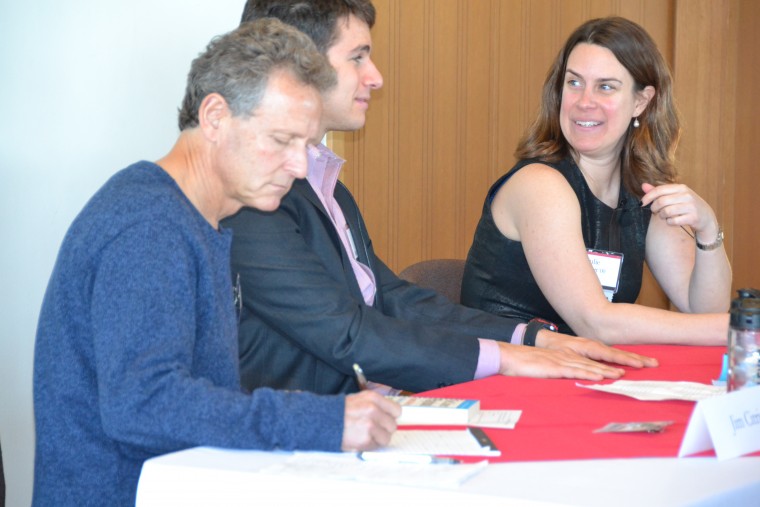

“What Does It Take to Launch a Successful Career?” Two notable members of the Wesleyan community tackled that question in a career workshop titled Your Career Playbook, sponsored by the WESpeaker Series, the Athletics Advantage Program and the Wesleyan Career Center on Feb. 26.
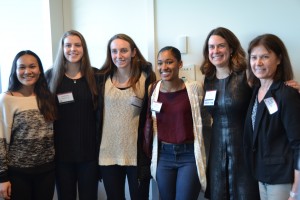
Julie Bennett ’00, former captain of the women’s basketball team and member of the Athletic Advisory Council and now in sales and trading in equity derivatives at Citigroup (her “dream job”) joined Wesleyan trustee Jim Citrin P’12, P’14, leader of Spencer Stuart’s North American CEO Practice, and author of The Career Playbook: Essential Advice for Today’s Aspiring Young Professional in a panel discussion, moderated by Zacko Brint ’16, captain of the men’s tennis team. A self-professed “airline geek,” Brint will be working at United Airlines next year—a fact that he says came about through his use the Wesleyan network.
Held in the Daniel Family Commons, the workshop was attended by more than 100 members of the senior class, many of them athletes, who were provided opportunities to ask questions of the panelists, as well as to network with additional alumni attendees.
“It’s brutal getting into the workforce,” said Citrin, noting this was true even for those with a Wesleyan education—although more so for those young people lacking the prestigious degree. “So I wrote this book to try and help,” promising a discussion of the tactics he outlined in the book. He also noted that a benefit to a Wesleyan education was the Career Center and the Wesleyan alumni network to which they could connect the undergraduates.
“You’re going to hear the theme of leveraging your networks,” said Bennett, who was an American Studies major and got her first job—at Merrill Lynch—through connections she’d made within her sport.
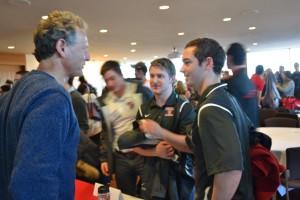 Brint opened the discussion by asking how to leverage the liberal arts degree in the job search, even when up against those with degrees from preprofessional institutions.
Brint opened the discussion by asking how to leverage the liberal arts degree in the job search, even when up against those with degrees from preprofessional institutions.
“We’re all big believers in liberal arts education,” said Citrin, yet noted that statistics show liberal arts graduates— particularly humanities students—are initially most likely to be unemployed, underemployed, or earning lower wages than their technically educated counterparts.
“Over about four years that curve changes,” he continued, noting that those liberal arts students who apply problem solving and synthesis are likely to become the supervisors of graduates from preprofessional institutions.
“Getting in, however, is the challenge,” he said. For his book he interviewed more than 100 CEOs and heads of human resources to find “What does the liberal arts student have to do to get you to bet on them?”
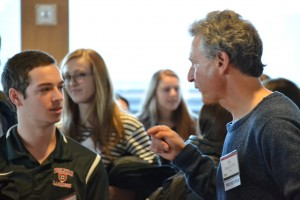 He found that the employers were looking for the applicant to communicate well, linking what they have done to what the company does.
He found that the employers were looking for the applicant to communicate well, linking what they have done to what the company does.
“The onus is on you,” says Citirin, “and be ready to do some things outside of the pure humanities. Take at least one computer science course, so you have the language and the fluency. Then you can make the case for your integrative learning.”
Bennett noted this same question on the value of liberal arts was particularly prevalent in her field.
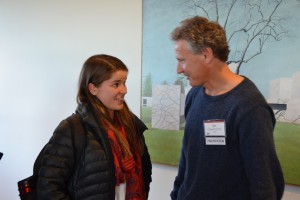 “I’ve had students come to me, a little apprehensive about their ability to get a job in finance,” she says. “I tell them, I’d take a Wesleyan student or a NESCAC student over another from a preprofessional school any day. You’re going to learn the day-to-day skills you need in your seat on the job,” she says. “Liberal arts students have the well-rounded aspect—you have so much more that will make you a better employee.”
“I’ve had students come to me, a little apprehensive about their ability to get a job in finance,” she says. “I tell them, I’d take a Wesleyan student or a NESCAC student over another from a preprofessional school any day. You’re going to learn the day-to-day skills you need in your seat on the job,” she says. “Liberal arts students have the well-rounded aspect—you have so much more that will make you a better employee.”
Citrin adds further encouragement: “You’ll work for 15 different companies. You don’t have to get the perfect first job right away.”

